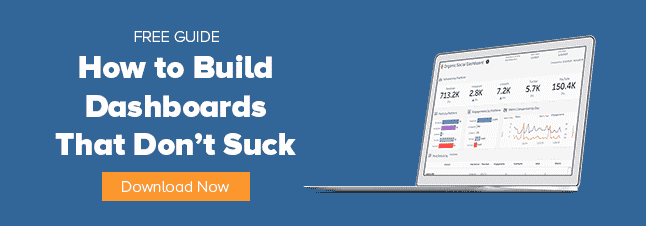
If you’re shopping for marketing analytics software, it’s normal to feel a little overwhelmed.
There are roughly 50 million tools on the market — just a ballpark estimate — and it can be very difficult to tell all of that software apart because so much of what’s being offered looks so similar.
Plus, it’s not always clear if a piece of software will actually do what it promises. That’s a little scary considering how much time and money it takes to get up and running with a new analytics tool.
How can you find the best marketing analytics software for your team?
To help you find a solution that meets your team’s unique needs, we’ve built the following list of questions, broken out by four core goals. These are some of the most important questions you can ask anyone trying to sell you a marketing analytics platform.
If You Want to Measure Media Performance
This is where most marketers start their analytics journey. They want a faster, more complete way to report on their campaign performance.
They need a solution that can quickly pull together data from multiple sources and produce analysis-ready datasets — ones that show results across channels.
They’ll also need a way to visualize that data, so they can make it easy for audiences to understand what’s happening.
Good questions to ask are:
- How much time does it take to use this platform? Will you need to dedicate an employee to managing and supporting this tool? If so, how much of their workweek will it take?
- Can this solution create cross-channel and campaign-level datasets? From all your sources, including offline media like TV and radio? Or will you have to blend data sources on your own?
- Does the solution store the marketing data it collects? Some tools don’t actually store data — they just pipe it into a dashboard, while the underlying data continues to live in the source systems. Which means you won’t be able to hold on to all the historical data you might need later for advanced analysis and modeling.
- How do I visualize my data? Does this platform have its own dashboarding tool? Will it let you use that data with other BI and visualization tools?
- If a data connection fails or breaks, who is responsible for repairing it? Unfortunately, with a lot of systems, the user is responsible for troubleshooting and fixing problems.
Related: With Marketing Analytics, You Get What You Pay For
If You Want to Optimize Marketing Touchpoints
With better insights, you can make your marketing more efficient and effective. To do that, you’ll need to know what channels, campaigns and ads are responsible for generating results. You also need to know how close (or how far) you are from hitting your goals, so you can adjust your strategy ASAP.
You should ask:
- Does this solution include any tools for campaign pacing? Will it show you how much progress you’re making toward your goals? Or show you how much budget you have left to spend?
- Does this solution offer built-in tools for multi-touch attribution? Will it show you which channels are helping to produce conversions? Are you able to choose the scenario that will drive the greatest ROI for your budget?
If You Want to Analyze & Forecast Marketing’s Impact on Sales
Marketing shouldn’t live on an island. In a perfect world, you should have a clear view of the entire customer journey, including the later stages of the sales funnel. That way, you can help diagnose problems and measure marketing’s impact on sales, revenue and other bottom-line outcomes.
You need to know:
- Can this solution bring in business data from CRM, ERP and POS systems and integrate it with your marketing data? Ingesting data from business systems can be tricky, especially if it’s a custom-built platform.
- Will you be able to visualize your entire sales and marketing pipeline? In one view? That way, you can see how marketing impacts sales at each stage in the buyer’s journey.
- Will this platform help you forecast and track the return on your planned marketing spend?
Related: Should You Build or Buy a Marketing Analytics Solution?
If You Want to Plan Marketing Mix and Predict ROI
This is the most advanced, most technically challenging level of marketing analytics. You’re using marketing mix models to plan your upcoming campaigns and even predict what kind of results you’ll see based on different levels of spend.
If this is your goal, you need to ask:
- Does the solution’s database architecture support statistical modeling languages, especially for custom situations?
- Do you have people on your team — or does your vendor have people on staff — who can build or customize a model?
We’ve compiled these questions into a handy checklist you can fill in the next time you’re in conversation with a marketing analytics platform vendor.

